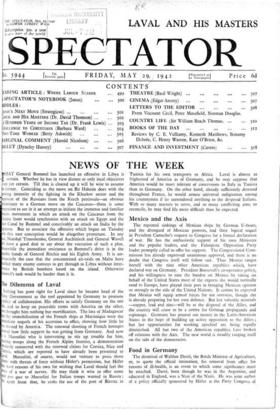Food in Germany
The dismissal of Walther Dane, the Reich Minister of Agriculture, or, to quote the official intimation, his removal from office for reasons of ill-health, is an event to which some significance must be attached. Darre, born though he was in the Argentine, and educated in England, was a Nazi of the Nazis. He was joint author of a policy officially sponsored by Hitler at the Party Congress of 1935. Before that party, indeed, had come to power, in 1930, he had outlined a tentative agrarian programme. He was the chief gospeller of the Blood and Soil doctrine—racialism to the utmost. He has laid himself out to secure the maximum yield from the soil of Germany, and now that that yield is palpably unequal to Germany's needs he is sacrificed as victim. His departure may nos mean much difference in actual efficiency ; his successor, Backe, has for some time been his right-hand man. But it means a good deal as an index of possibilities. The food that Germany needs is not to be got from her own soil, and there are many indications that little more can be secured from subject Europe ; it has just been announced, for example, that the Hungarian harvest, on which Germany depends largely, is likely to be abnormally light, owing to weather conditions in the winter. Germany is not starving, or near it, but the food-situation is known to he increasingly difficult, and it may be more difficult than is known outside. We are rightly con- scious of our own problems. But the enemy, too, has always problems that we cannot see.



























 Previous page
Previous page